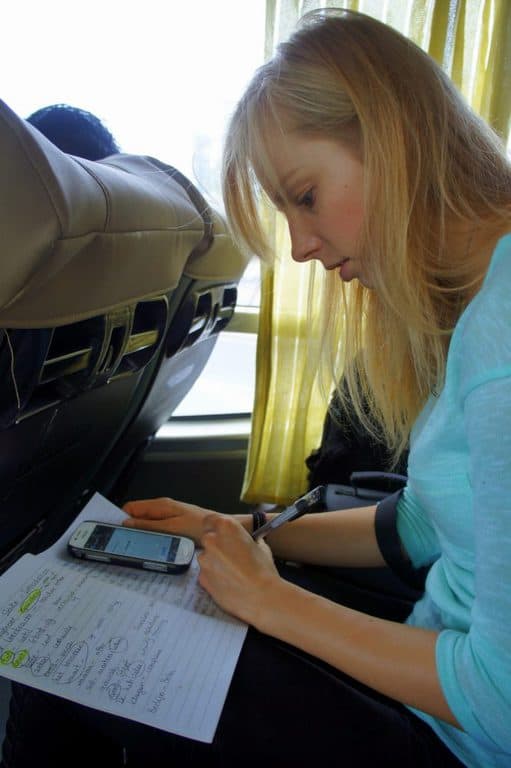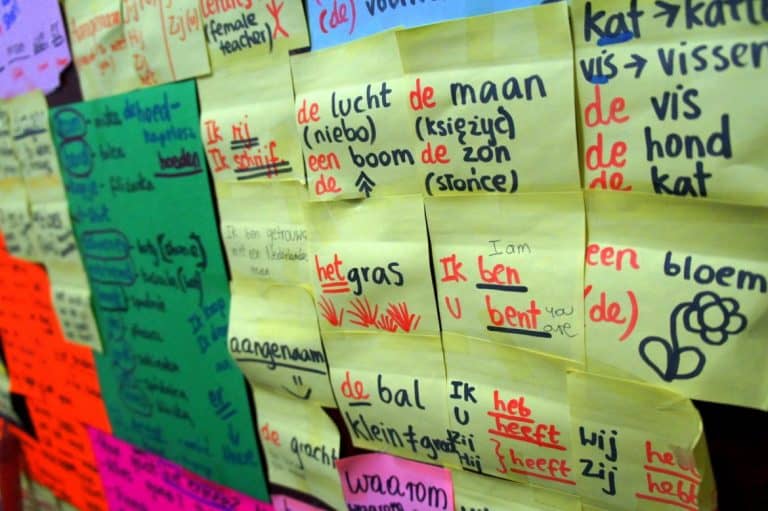Those who read my blog on a regular basis know that I love learning foreign languages. In fact, I pick up new words and sentences quite easily and I have a good memory when it comes to memorizing words in different languages. I’m passionate about new sounds, grammar and writing. As a native speaker of Polish, I can also speak English, Spanish, basic Chinese and I understand a lot of German. Last September, when I was back in China from Europe, I decided to start learning Dutch. Why Dutch? As you may already know, I’ve moved to Amsterdam for 10 months to start my Master’s Degree in New Media and Digital Culture at UvA.

Although everyone speaks English in Holland, I still wanted to be able to communicate with locals in their native language – Dutch. One of my goals right after I came back to China in September 2013 was to study Dutch daily – 30 minutes a day, no excuses, no matter what. Guess what… I made it. I studied Dutch every single day for nearly 11 months even when I was traveling across the Philippines, Indonesia, Hong Kong, Singapore and more. I studied when I was on the bus, on the plane, at the airport, back in my apartment or out and about. In today’s post, I would like to share with you some of my useful tips on how to comprehend Dutch in 3 months. Although I studied it much longer than 90 days, I’m sure you could understand a lot of Dutch and be able to speak it quite fluently after just 3 months without spending a cent!
Quick Navigation
ToggleHere is how and you can use these tips when learning any foreign language:
1. Deciding what your main purpose of studying Dutch is.
Before you start learning Dutch (or any other language),you should ask yourself a simple question: why do I want to learn the language? You might want to learn a new language for pleasure, academic and travel purposes, work, communication, culture, religion, food, etc. Once you know that, you can decide on which language ability you must focus on – speaking, writing, listening or maybe grammar.
As for me, I wanted to learn Dutch for my studies and travels. I decided to focus on developing my listening and speaking abilities to be able to understand people and have a simple conversation with them.
2. Find free learning sources.
There are plenty of free websites you can use to learn Dutch. My favorite one was Taalthuis. It contains all the basic grammar, vocabulary and even pronunciation rules you need and a lot of online tests and tasks. I used it every two or three days and it turned out to be one of the best sources for me to comprehend Dutch quickly and effectively.
I would also recommend Rosetta Stone to everyone who starts learning any foreign language. It’s a language learning software available in 24 languages from the most commonly spoken (such as English, Spanish and Mandarin) to the less prominent (including Irish, Swedish and Tagalog). The Dutch one was divided into 3 levels and it took me about 3 months to complete each of them.
With Rosetta Stone, I was able to learn Dutch in real-life scenarios without translation or memorization. I was able to speak, record and listen to my first words and phrases in Dutch and get immediate feedback. I easily installed it on my laptop and I could use it anywhere without having an access to the Internet. The programme also allowed me to monitor my progress from the day 1 and I could always get back to previous lessons for review. If you studied with Rosetta Stone approximately 2 hours a day, you would be able to speak basic Dutch in less than 3 months, that’s for sure!
Pro tip: Not free, yet not as expensive as Rosetta Stone, are Dutch language learning books. Check this book out first. As you progress with your learning you can move on to other resources.
3. Look for a language exchange partner.
That’s the best idea for a quick language learning. I used MyLanguageExchange website to find my language exchange partner. I paid $5 for a premium account (you can get a basic one for free) and it took me about 2 weeks to finally find someone who wanted to teach me Dutch in exchange of my Polish. Me and my language partner named Yvo from Belgium quickly became friends and we messaged each other weekly or sometimes daily when having some problems with grammar or speaking.
Me and Yvo spoke a lot on Whatsapp and Facebook. Whether I was traveling or not, I sent him some grammar tasks to review, recorded myself and asked for some feedback, etc. He was super patient with me and so accurate when it came to checking homework or speaking activities. We are planning on meeting each other this summer and traveling through some towns and cities in Belgium!
4. Create a language learning environment.
After a few days of studying Dutch, all walls of my flat were covered with colorful paper notes with different phrases and words in Dutch I could not memorize easily – Past tense forms, de and het articles, famous quotations, etc.
It’s a great way to learn a new language in a quick amount of time for those who are visual like me. I placed different words all over my flat so everything I looked at my bed I saw a note in Dutch saying “het bed”.
I also downloaded a free book with all Dutch grammar essentials written in Polish language. I used it a lot when writing a short passages about my hobbies, lifestyle, food, travels, etc.
5. Practice every day, for 90 days.
Consistency is the key to language learning. It’s more efficient to study a new language for 15-30 minutes every day for a year than learning 2-3 hours a day for a week and then stop and come back and stop again. Try to study regularly and you will see first results after a week.
6. Monitor your progress.
Test yourself weekly to see how it goes. I did a review every week or two with Rosetta Stone so I knew exactly what I had to improve when it come to studying Dutch. I had my good weeks where I completed a lesson with 100% and I had bad days…
when my results were below %100.
You should definitely take some tests online to see whether you are going in a right direction or not. Maybe your grammar is excellent, but you need to work on your speaking – that’s something you can find out when testing yourself on a regular basis.
7. Enjoy it and never give up!
The longer you study, the better results you can see so the last thing you can do is to give up. There is always a way to improve your speaking, writing or grammar by studying more often or longer. Ask for help, try to find your way to enjoy your study and keep practicing! This feeling when you understand someone speaks the language you have been studying for weeks is priceless!
Have you ever learned a foreign language? If so, what language was it and how hard was it to learn in less than 3 months?













